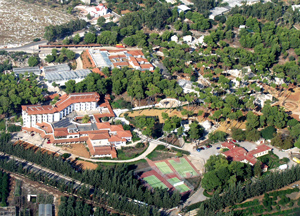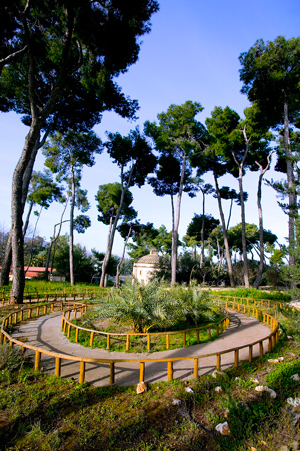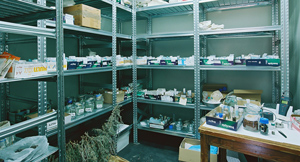The Mediterranean Agronomic Institute of Chania, MAICh (Crete, Greece)

The Mediterranean Agronomic Institute of Chania - MAICh (Photo: MAICh)
The Mediterranean Agronomic Institute of Chania (MAICh, http://www.maich.gr) is the most recently established (1985) of the four Mediterranean Agronomic Institutes administered by the International Centre for Advanced Mediterranean Agronomic Studies (CIHEAM, http://www.ciheam.org) whose General Secretariat resides in Paris (France). The Mediterranean Agronomic Institutes of Bari (IAMB, Italy), Montpellier (IAMM, France) and Zaragoza (IAMZ, Spain) are constituent Institutes of the same organisation. The annual budget contribution of the Mediterranean Agronomic Institute of Chania is entirely provided by the Greek government.
MAICh provides postgraduate education leading to the degree of Master of Science (M.Sc.) for the following programmes:
- Business Economics and Management
- Geo-information in Environmental Management
- Horticultural Genetics and Biotechnology
- Food Quality Management and Chemistry of Natural Products
- Natural Products and Biotechnology
- Sustainable Agriculture
It undertakes basic and applied research related to the sectors of economics, rural development, management, and applied biological, technological and environmental sciences, addressing to problems in the Mediterranean area.
The Mediterranean Plant Conservation Unit (MPCU) of MAICh

Botanical Garden (Photo: MAICh)
The main objective of the Mediterranean Plant Conservation Unit of MAICh is the study and conservation of the wild native plants of the Mediterranean. It is a member of the Mediterranean network of seed banks GENMEDA (in total, 13 members from North and South Mediterranean) and of the European Native Seed Conservation Network ENSCONET. In ENSCONET, the MPCU is the local coordinator for the SE Mediterranean region. The MPCU is also a member of the Greek National Network of Botanical Gardens that is represented in BGCI.
Facilities: It comprises a Seed Bank established in 2000 that preserves accessions of wild, endemic and threatened plants of Crete and the Mediterranean. The infrastructure of the seed bank provides all the essential steps for the preservation of the seed germplasm, such as Collection (well experienced personnel on collection of Cretan flora and on plant identification), Seed drying (drying room with relative humidity 15-20% and 15oC), and Storage (cold room at -18oC). In addition, there is a fully equipped laboratory for germination experiments (six germination chambers with controlled temperature and light conditions, dark room with safety light for studies on seed dormancy, etc). The Seed Bank works in a close association with the Botanical Garden where endemic and threatened plants are cultivated for demonstration and education purposes. The Herbarium of the Unit hosts specimens from the most important plant species of Crete and disposes all the required facilities for taxonomic plant identification in the area.

Dry room (Photo: MAICh)
Competences: more than 15 years of experience in the identification, taxonomy of the Mediterranean flora; study, management and protection of native plants (in situ and ex situ conservation) including endemic and threatened plants, medicinal and aromatic plants, wild relatives of food and agriculture plants; participation in several national and EU-funded research and cooperation projects (Interreg, LIFE, FP6, etc.) and networking; several publications and presentations in national and international conferences, workshops, etc.; good experience in the organization of training and dissemination seminars, workshops, events, etc. about the conservation of plant biodiversity.

